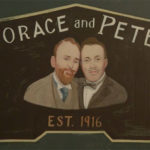“They’re dead!” I shouted into the phone. “How the hell could they have put more money on this credit card when they’re dead?!”
There was a lot to sort out after my parents died. Every bank account and mutual fund had to be found and transferred. The house had to be sold (with the mortgage paid monthly until it was). I faxed death certificates and met with lawyers more often than I ever thought I could. Also, every credit card had to be closed. The woman on the phone represented a credit card company claiming there was an outstanding balance. A balance incurred after they had died. I’m not exaggerating much when I say that I owed it to my mother’s memory not to get screwed over on a phony charge. (She had only signed up for this damn card to get some kind of discount on checkout.) I was just so damn frustrated with all of it. So, I shouted at her.
It was also the most unabashedly straightforward I had ever been about my parents being dead.
The problem is this: it’s a fact. My parents are dead. I often need to convey this information to someone after they ask about my family. However, this fact, when stated, can make the person who asked feel awkward and that’s what I want to avoid. I feel like it’s my fault, frankly. I threw you a curveball by being an orphan in my thirties.
I never noticed before how often this comes up. It’s happened a couple of times recently and why wouldn’t it? I meet a friend of a friend who’s engaging in small talk. “So, where are you from?” Rochester. “Oh, are your parents still in Rochester?” It follows pretty naturally in standard get-to-know-you chit chat. And then I have to choose to either tell the person or avoid the question.
I still have yet to get it right. I could say, offhandedly, “Oh, they’re dead,” which is pretty callous. I suppose I could apply the proper amount of solemnity. I’d bow my head, purse my lips and say in a hushed tone, “my parents… you see… they, they have passed away.”
Lately, my preferred statement has been “they’re no longer with us”. It’s a strange phrase. “No longer.” Who talks like that? “Joyous and abundant were the days when my parents walked the earth! Alas, that time is no longer.” And “with us”. With whom? Who’s us? My family? The brotherhood of man?
But it works. The tone is plain enough and you don’t have to say the word “dead”.
Maybe I should get better at avoiding the question. Or lying. “Yes. They’re still in Rochester.” I have said that before and let myself off on the technicality of having parental surrogates in Rochester. It’s occurred to me, because my parents are buried in Rochester, to say “well, technically they’re still there.” Perhaps my father would have appreciated a questionable wisecrack about death (even his own, I think). Not me.
There are only a few circumstances where it’s not incredibly awkward. The first is when a person is told by someone else when I’m not there. The wrinkle there, though, is I have no confirmation that they definitely know my parents are dead. So, it often requires an aside. “You, uh, you know my parents are dead, right?” “Yeah, Jeff told me.” “Okay, just checking.” It might actually be nice, and I’m sure this will never happen, if someone anticipated their deaths. “So, do your parents still live in Rochester or did they die six months apart when you were in your early thirties?” Saying “the latter” with an understanding head nod from the person who asked would be pretty smooth. Doctors are wonderfully clinical. “Parents?” they ask in regards to my medical history. I can then give back the equally clinical “deceased” without any awkward exchange of sympathy.
When my mother died everyone told me that their thoughts and prayers were with me and my father. Thoughts and prayers. We say that don’t we? I know I have. Thoughts. “I will think of you and hope that you’re okay.” Prayers. “I’m doing it in an appropriately solemn way.” After all, you don’t say “you’re in my thoughts and knock knock jokes.” Perhaps a Catholic friend or two lit a candle for my mother but I don’t know if anyone actually prayed for her. But I guess when you say that you’re just letting the person know “I acknowledge this, it’s sad and I’m sorry.” And there’s not much else you can do. No one can take the pain away from you. That’s a journey you take alone.
When my father died, people said, “I can’t even imagine” and then trailed off, leaving “what you’re going through” or “how I’d deal with that” understood. Before my father died, I thought of how distraught I would be if I lost him too. I pictured myself suicidally despondent. But, when it happened, I just had to accept it. I don’t know if I mourned his death as much as I resigned myself to it. The thing is, you can imagine. You just don’t want to. I get it. Do you want to know what it’s really like? It’s lonely. The people who were here before me, who brought me here, and who would always have my back are gone. The feeling is hard to describe but it’s somewhat like being untethered or disconnected and I don’t even know from what.
But that’s my shit and I don’t want to bring someone into it for making small talk.
I’m still figuring it out. I think about them all the time. I see them in myself and I love it and hate it in equal measure. I talk about them in therapy. Some days I want to hug them others I want to punch them both in the face. But I will never do either. They’re dead.
Sorry. I mean they’re not with us anymore.




